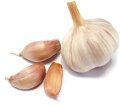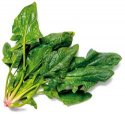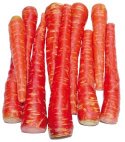Sore throats, running nose, sinusitis, high temperature, cold and cough are all common problems in winter. Moreover, our appetite tends to increase during this season as our body needs more energy to keep itself warm. But if you eat indiscriminately, there’s a high chance that you might put on weight. Hence, what you need is to not just eat more, but also to eat right. This will help you keep your weight in check and also combat ailments of the season.
Garlic
 This commonly used spice contains allicin, a chemical that has many medicinal properties. Allicin in garlic is released as soon as the clove of the garlic is crushed and starts degrading if left unused. So make sure you peel and crush the garlic cloves just before using them. It strengthens the immune system, thereby protecting you against infections. Garlic also has anti-bacterial, anti-fungal and anti-viral properties. Further, it helps scavenge free radicals and lower cholesterol levels. Hence, it is good for people with heart disease.
This commonly used spice contains allicin, a chemical that has many medicinal properties. Allicin in garlic is released as soon as the clove of the garlic is crushed and starts degrading if left unused. So make sure you peel and crush the garlic cloves just before using them. It strengthens the immune system, thereby protecting you against infections. Garlic also has anti-bacterial, anti-fungal and anti-viral properties. Further, it helps scavenge free radicals and lower cholesterol levels. Hence, it is good for people with heart disease.
Ginger
 Ginger helps digest fatty foods and break down protein. When consumed, it produces heat, which has a natural decongesting action. It is hence recommended in cold, cough, flu and headaches. It also eases heartburn and is commonly used in tea for flavouring.
Ginger helps digest fatty foods and break down protein. When consumed, it produces heat, which has a natural decongesting action. It is hence recommended in cold, cough, flu and headaches. It also eases heartburn and is commonly used in tea for flavouring.
Honey
 Honey is an instant energy booster as it directly gets absorbed in the blood stream. Due to its anti-microbial properties, it is beneficial in sore throat. It is also an effective anti-allergic, helping prevent seasonal allergies.You can apply it to chapatti/bread or to milk as a sweetener. When applied to the skin in winter, it helps keep the skin hydrated as it attracts water and prevents drying.
Honey is an instant energy booster as it directly gets absorbed in the blood stream. Due to its anti-microbial properties, it is beneficial in sore throat. It is also an effective anti-allergic, helping prevent seasonal allergies.You can apply it to chapatti/bread or to milk as a sweetener. When applied to the skin in winter, it helps keep the skin hydrated as it attracts water and prevents drying.
Green leafy vegetables
 A wide variety of fresh green leafy vegetables like spinach, fenugreek and amaranths are readily available in this season. Not only do they add taste and variety to food, but also have numerous health benefits. They are packed with lots of minerals like potassium, iron, calcium and magnesium and are a rich source of vitamins like K, E, B, folic acid and most importantly vitamin C, which builds immunity. Green leafy vegetables also contain phytonutrients. So take the seasonal advantage and include as many greens in your diet as you can; it’s the best time to eat these.
A wide variety of fresh green leafy vegetables like spinach, fenugreek and amaranths are readily available in this season. Not only do they add taste and variety to food, but also have numerous health benefits. They are packed with lots of minerals like potassium, iron, calcium and magnesium and are a rich source of vitamins like K, E, B, folic acid and most importantly vitamin C, which builds immunity. Green leafy vegetables also contain phytonutrients. So take the seasonal advantage and include as many greens in your diet as you can; it’s the best time to eat these.
Sweet potatoes
 Sweet potatoes are known as ‘winter’s staple’. They are a dense source of vitamins A and C, both of which have strong anti-oxidative properties that remove free radicals from the body and lower the risk of infections and inflammations. They are a high fibre food that are good for your digestive health. The peculiar aroma of sweet potatoes is known to cure nasal congestion. It also keeps the body warm.
Sweet potatoes are known as ‘winter’s staple’. They are a dense source of vitamins A and C, both of which have strong anti-oxidative properties that remove free radicals from the body and lower the risk of infections and inflammations. They are a high fibre food that are good for your digestive health. The peculiar aroma of sweet potatoes is known to cure nasal congestion. It also keeps the body warm.
Sesame seeds
 Sesame seeds are loaded with magnesium, copper, calcium, vitamin B and vitamin E. They provide heat to the body after digestion, which is helpful in winters. Regularly having sesame seeds prevents high blood pressure. You can roast the seeds and add to salad or to the dough while kneading breads/chapattis.
Sesame seeds are loaded with magnesium, copper, calcium, vitamin B and vitamin E. They provide heat to the body after digestion, which is helpful in winters. Regularly having sesame seeds prevents high blood pressure. You can roast the seeds and add to salad or to the dough while kneading breads/chapattis.
Carrots
 Carrots, especially the red variety, are easily one of the favourite vegetables of the season. They are a rich source of beta carotene, which gets converted into vitamin A—the vitamin that gives you good sight. Being a solid source of antioxidants, they boost immunity by fighting free radicals. The phytochemicals present in carrots bestow on them antiviral and antibacterial properties.
Carrots, especially the red variety, are easily one of the favourite vegetables of the season. They are a rich source of beta carotene, which gets converted into vitamin A—the vitamin that gives you good sight. Being a solid source of antioxidants, they boost immunity by fighting free radicals. The phytochemicals present in carrots bestow on them antiviral and antibacterial properties.
Citrus fruits
 Citrus fruits like oranges and sweet limes are rich sources of vitamin C. Citrus fruits are highly recommended during the winter season not only to prevent flu and cold, but also as a curative measure. Apart from vitamin C, citrus fruits are rich in vitamin K, thiamine, niacin and dietary fibre. They are also good for toning the skin during winter.
Citrus fruits like oranges and sweet limes are rich sources of vitamin C. Citrus fruits are highly recommended during the winter season not only to prevent flu and cold, but also as a curative measure. Apart from vitamin C, citrus fruits are rich in vitamin K, thiamine, niacin and dietary fibre. They are also good for toning the skin during winter.
Peanuts
 Peanuts generally misconstrued as nuts are the part of legume bean family. They are also known to boost energy levels and are a powerhouse of protein. They are rich in coenzyme Q10, which is known to decrease the risk of heart ailments, migraines and headaches. So grabbing a handful of peanuts every day in winter is good for you.
Peanuts generally misconstrued as nuts are the part of legume bean family. They are also known to boost energy levels and are a powerhouse of protein. They are rich in coenzyme Q10, which is known to decrease the risk of heart ailments, migraines and headaches. So grabbing a handful of peanuts every day in winter is good for you.
Tea
 Nothing is as comforting and refreshing as sipping a hot cup of tea during winters. Tea is a rich source of antioxidants and amino acids. It acts as an immunity booster due to the presence of antioxidants and also boosts mental alertness because of the amino acids. Green tea and black tea are the most beneficial varieties.
Nothing is as comforting and refreshing as sipping a hot cup of tea during winters. Tea is a rich source of antioxidants and amino acids. It acts as an immunity booster due to the presence of antioxidants and also boosts mental alertness because of the amino acids. Green tea and black tea are the most beneficial varieties.
So, enjoy the winters with these versatile and tasty foods loaded with numerous health benefits.
 Spot an error in this article? A typo maybe? Or an incorrect source? Let us know!
Spot an error in this article? A typo maybe? Or an incorrect source? Let us know!

Thanks for the ingredients, they should really help. It would be great, if you could also share a few recipes for some great winter dishes
The Golden Estate
Privileged Living for Senior Citizens